Bad News-Good News
Francis a. Beer
G. R. Boynton
Global
News and the Aftermath of War in
Global news broadcasting now reaches
its audience very nearly in real time. The technology facilitating global
communication via TV broadcasting and via the web is readily available. Even
though the audience is small, there are enterprises that aspire to communicate
with this global audience. We studied the development of global television
news broadcasting between 1998 and 2003: both CNN, with WorldView, and BBC,
with World News, reached out to a global audience. Recently Aljazeera developed
an English language website to reach out to a broader world audience. The
news on the Aljazeera website can be compared with the news on the globally
oriented pages of the websites of BBC and CNN, permitting us to examine the
construction of the news across the principal cultural divide of our day.
We compare the stories about the conflict in
Similar
and Different Global News Media Stories about
There were very few days without a story about Iraq. Aljazeera had a story about Iraq on all but three of the 155 days. And BBC and CNN were not far behind; BBC had a story about Iraq on all but sixteen days and CNN had a story about Iraq on all but 12 days. Aljazeera had a mean of 3.7 stories per day whereas, BBC and CNN had about half as many stories. The mean for BBC was 1.8 and it was 2.0 for CNN.
| Aljazeera |  |
| BBC World |  |
| CNN World |  |
Moreover, the distributions were rather different. The distribution for Aljazeera was approximately normal. There were as many days with six stories as days with only one story. The distributions for BBC and CNN were both positively skewed. They peaked at one story per day and declined from there.
Iraq was often the lead story on the news websites. The websites are laid out in ways that make it easy to determine the lead story.
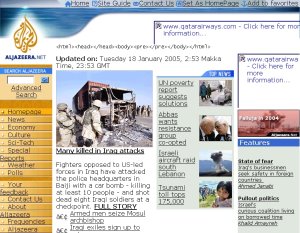 |
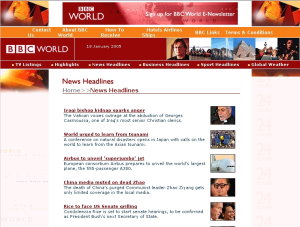 |
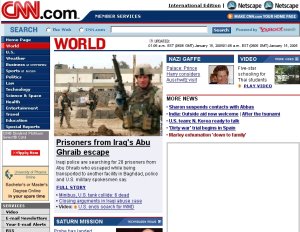 |
Aljazeera |
BBC World |
CNN World |
The picture at the top left on the Aljazeera website identifies their lead story, and the same is true for CNN World. The first page to BBC World that we used is a list -- with a first story on the list. Iraq was the first story on the Aljazeera website 69 of the 155 days, 45 percent of the days. It was the lead story for CNN World one-third of the days, 49 of 155 days. It was the lead story least often on BBC World, only 17 times or 11 percent of the days.
If you only glanced at these websites
you could not miss Iraq. If you read them carefully you would have access
to many details about events in
Non-Iraq
Stories
The not-Iraq lead stories on the
Aljazeera website were predominantly about the
By design the coverage of CNN World
is broader than is Aljazeera's coverage. Every day there are three stories
about each of five regions of the world --
One more way to examine the focus
of the three websites is to look at the stories that were the lead stories
on the three websites simultaneously. What stories are so important that all
three websites make them the lead story of the day? The death of the pope
and the election of a new pope was lead story for all of the websites on three
days. There were five stories about secular leadership change: Blair's election,
Abbas' election, two stories about the elections in
Stories
of Death and Destruction in
Whether glancing at or reading
carefully stories about
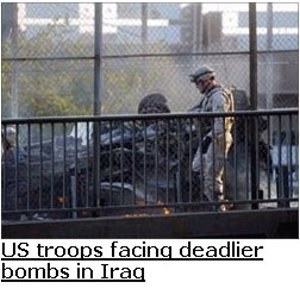 |
More powerful bombs are being used to target US soldiers in Iraq, a senior Pentagon military official has said. |
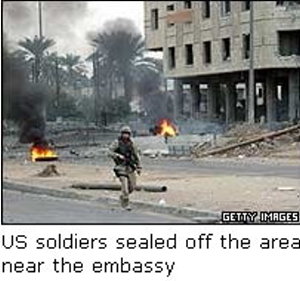 |
Two suicide car bombs hit Baghdad, killing at least one person and injuring several others. |
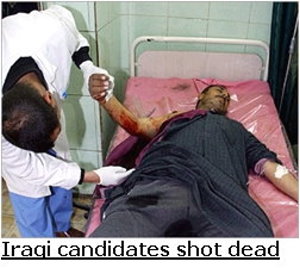 |
Unknown assailants in southern Iraq have gunned down two more candidates running for the political coalition of interim Prime Minister Iyad Allawi in the 30 January elections. |
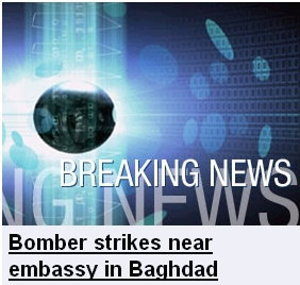 |
Casualties have been reported from the scene of a suicide blast near Australia's embassy in Baghdad. Moments later, a bombing was reported at a police headquarters in the city. |
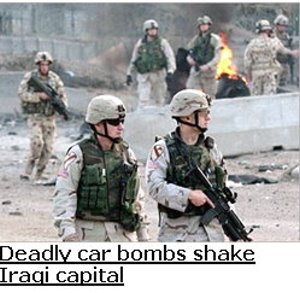 |
Five bombs, including one near the Australian embassy in Baghdad, along with a checkpoint shooting, have killed 26 people and wounded many, the US military says. |
This was not the aftermath imagined
by the Bush administration when the president declared victory. Even though
the administration urged the media to present the positive side of the story
[Rumsfeld, June 28, 2005] over and over the story was death and destruction.
Of the 135 lead stories about
Stories
of
The aftermath the
One element of nation building is security -- security for the personal of the state. Anti-US fighters challenged nation building by attacking the fledgling state security forces and officials who were temporarily managing affairs of state. Security was not good anywhere in Iraq during the spring of 2005, but the numbers in figure xx are only the number of attacks on the police and security officials and attacks on officials of the state. While there are more attacks in some ten day periods than others the attacks never cease. Even three government officials killed in a ten day period is a serious attack on the security of the state.
Against the backdrop of attacks against security forces the other elements of nation building played themselves out in time. First there were stories about the coming election -- ten stories in the first period and 12 in the second period. Of the twenty-two stories thirteen were about attacks threatening the election: Allawi acknowledges that security will prevent voting in some sections of the country, Zargawi vows war on Iraq poll, and violence spreads in Iraq poll runup. Less attention was devoted to the parties and candidates contesting the election than was devoted to the challenge to the security of the election.
The vote was January 30. There were stories about voting from abroad, about the millions of Iraqis who braved bombs, and the confusion about turnout, which had to be lowered. Voting irregularities were acknowledged and a variety of groups questioned the legitimacy of the election. It took two weeks to get a result; the major Shia parties won forty-eight percent of the vote and received fifty percent of the seats. The Arab press was wary of poll results, but world leaders sent their congratulations. The stories were concentrated in the second period, which included the date of the election, and the next two periods as counting and criticizing stretched through three weeks.
With the vote count finished the political bargaining began in earnest. Counting the vote took two weeks. The majority Shia parties took a week to settle on a prime minister candidate. It took another three weeks for the Shia parties and the Kurdish parties to agree to form a government together. In another week the parliament met, but no officials had been elected. Five weeks later the prime minister took his cabinet to parliament for approval. But it was an incomplete cabinet -- deals had not been closed. Ten days later, May 9, the full cabinet was approved. It took from January 30 to May 9 to produce a government.
The principle casualty of the delay in forming a government was constitution writing. When the government was formed bargaining about the membership of the constitution writing panel began. The Sunnis who had boycotted much of the process up to this point now wanted in. Another five weeks of hard bargaining was required, and a panel was approved on June 17. The deadline for their work was August 15, which is constitution writing on the fast track.
The time period we examined ended as it began.
Rumsfeld: Iraq 'no more safe than in 2003'
Sunday blasts kill 33 in Mosul
US to expand its prisons across Iraq
Iraqi PM optimistic on security
Al-Zarqawi: We have Egyptian envoy
Even foreign diplomats were not safe from the anti-US fighters.
Bad
News-Good News
Three news organizations with different roots had the same story to tell in the spring of 2005. It was a story of unremitting violence at the hands of anti-US fighters and Iraqi self governing getting off to a slow and bumbling start. There were modest differences in focus. There was twice as much of everything at Aljazeera. BBC weighed news from Iraq as less important than did the other two. But broadly construed they told the same story.
It was a bad news story at almost every turn, and an administration that desperately wanted good news. Secretary of Defense Rumsfeld had an explanation.
US Defense Secretary Donald Rumsfeld has told the BBC his country needs to do a "better job" at communicating its policies to the rest of the world. "I think the US is notably unskilful in our communications and our public diplomacy," he said in Washington. [BBC World June 15, 2005]
It is just a public relations problem.
A better interpretation would involve the first rule of political journalism: bad news trumps good news almost every time. Only patriotism in the face of extreme stress turns this rule off. News organizations that aspire to a global audience cannot practice patriotism.